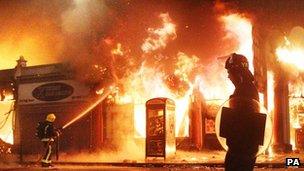'Swift justice' pilot schemes unveiled
- Published

A substantial increase in the number of flexible criminal justice pilot schemes across England and Wales is to be announced by the government.
The measures include the extending the hours of magistrates' courts and maximising the use of video links.
The pilot schemes will launch in 48 areas in the coming weeks, each testing one or more of the flexible measures.
It follows the response of courts to the aftermath of the August 2011 riots.
Courts across England opened for longer, some through the night, to deal with the large volume of people going through the criminal justice system.
Policing minister Damian Green will announce the new schemes during a visit to Cardiff Magistrates' Court where he will watch a video link being used.
The initiative is part of the government's reform White Paper entitled 'Swift and Sure Justice' published in July.
The aim is to modernise criminal justice services, speed up court cases and improve transparency for a better public understanding of how the system works and engage local communities in dealing with low-level offending.
Virtual courts
The pilot measures include extending the operating hours of magistrates' courts during the week and weekend opening.
As well as ensuring the maximum use of prison-to-court video links, the operation of virtual courts will be extended to allow preliminary hearings to be staged by video when a defendant is held in a police station beyond traditional court hours.
Neighbourhood justice panels, which involve local people deciding how offenders should make amends for low-level crime, have already been trialled in Sheffield, Norfolk and Somerset and are being tested in another 15 areas.
In October, Prime Minister David Cameron said the public wanted to see speedy justice, and that if it was possible in the wake of the riots then "let's make sure we do it all the time".
Typically, nearly five months pass between an offence taking place and a sentence being handed down, despite the fact that most cases do not have to go to trial or are uncontested.
But critics have expressed concerns about the staffing, cost and logistics involved in the flexible justice approach.
When the White Paper was announced, shadow justice secretary Sadiq Khan said it would not come cheaply and called on the government to explain how it would be funded.
Solicitor and legal commentator Greg Foxsmith said he was worried that justice would be lost in the push toward speed.
Javed Khan, chief executive of Victim Support, said: "Many people tell us that waiting for a trial is particularly stressful so if these changes mean victims and witnesses getting the ordeal over with sooner, then all the better.
"However, swift justice mustn't come at the price of making victims feel like a 'spare part' with all the focus being on dealing with the offender."
- Published13 July 2012
- Published11 August 2011